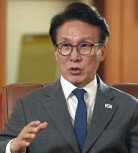[Opinion] Development Addiction
[Opinion] Development Addiction
Posted March. 27, 2005 23:24,
There was a period when development meant everything. Economic development and land cultivation were our missions, and there were quite a few real estate dealers who distributed name cards labeled President of xx Development. With the retreat of development age, year, and dictatorship, the terms meaning has withered as well. The Korea Research Institute for Human Settlement and the Korea Land Corporation both quickly dropped development from their original names. We were almost at the threshold of the age of quality, culture, and environment following the end of the age of quantity and development.
Development addiction, however, still runs high. After once saying that Seouls obesity could only be solved by moving the capital, they now say that they will build high buildings and a super-high municipal hall in the independent residential area near Cheong Wa Dae and Sejong Avenue, respectively. We can even hear the ambition to develop an underground area in Yongsan Park. They said that they are building an innovative city, but they are thinking about bulldozing land and constructing buildings before taking care of the essentials. They cut through mountains to widen national highways and release greenbelts to build new cities.
It is natural that land developers and constructors want to incite development. But it is pathetic that policy makers and implementers view cities and land as stages for such people. There is no way that software can upgrade itself just by changing the hardware. It is similar in that peoples health and happiness cannot be created by simple plastic surgery. Nonetheless, development-addicted authorities conveniently write up development prescriptions regardless of precise cases, and agencies that have dropped the name development in their titles are busy putting things in order.
The term development in English contains meanings of growth, development, maturity, advancement, improvement, and evolution. In other words, it signifies aggregate growth achieved not forcedly from without, but spontaneously, steadily, and in bits from within, so that both people and spaces can growth together. Development-addicted people fail to notice this internal and spontaneous growth. If the government turns a blind eye to this precious process and perceives cities and land in the eyes of land developers and constructors, it does not have the qualification to talk about advanced society any more.
Guest editorial writer Kang Hong-bin, professor, University of Seoul, Department of City Planning, hbkang@uos.ac.kr





![[천광암 칼럼]장동혁은 대체 왜 이럴까](https://dimg.donga.com/c/138/175/90/1/wps/NEWS/IMAGE/2026/02/22/133399127.1.jpg)

